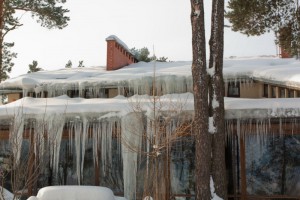Commonly seen by our neighbors to the North as well as here in the upper South, spalling occurs when water penetrates a masonry surface, including a brick chimney, and causes chipping and breaking of brickwork or concrete. Freezing temperatures are what causes the damage to the masonry materials because the trapped water freezes and expands, and this past winter has brought the Shenandoah Valley many instances of freezing temperatures. Fortunately, our expert chimney sweeps at Blue Ridge Chimney Services know how to prevent spalling from ever happening. We have seen all sorts of mortar deterioration, and we also know that the wrong diagnosis of a masonry problem may lead to the incorrect solution, which can cause even more damage. Our customers have asked us to explain exactly what spalling is, so we would like to share some facts with you about this type of masonry damage and how to best prevent it.
How does spalling occur?
The Chimney Safety Institute of America (CSIA) was not joking when they named water as the number one enemy of masonry chimneys. Water leaking into the bricks of your chimney can do all sorts of dangerous and expensive damage to the interior and exterior of your home, including spalling, water staining of ceilings and walls, a cracked or deteriorated flue liner, and a tilted or collapsed structure of the entire exterior of your chimney. If you notice loose bricks or mortar on your chimney’s outside, water has leaked into the mortar and its joints, weakening and softening them, causing spalling. The biggest cause of spalling, however, is when that water freezes inside your masonry chimney during the winter and then thaws, causing the mortar and bricks to crack, as the freeze/thaw process makes the water inside expand.
How can spalling be prevented?
Now that we have explained what spalling is, we would like to tell you the best ways of our preventing water leaks and spalling from occurring in your chimney structure, according to the CSIA:
Waterproofing
Specifically made to use as waterproofing agents on a masonry chimney, these 100% vapor-permeable formulas allow the brick and mortar of your chimney to breathe, allowing vapors to escape while still preventing water from entering. With a five to ten-year warranty, masonry waterproofing formulas should always be applied by experienced chimney masons, like the certified ones at Blue Ridge Chimney Services, to ensure the application of the correct formulas, preventing even more damage to your masonry chimney. We will also repair any spalling or other water damage before we apply our waterproofing formula.
Repairing a damaged chimney cap or crown
The protector at the top of your chimney suffers water and other weather exposure damage, along with your masonry chimney. The masons at Blue Ridge Chimney Services have experience with repairing damaged chimney crowns and caps and installing new ones when they are beyond repair. We can help you be sure your chimney is protected by a sturdy chimney cap or crown.
Customizing the flashing around your chimney
The metal sheeting around your chimney where it meets the roof, flashing serves to seal out water from your chimney. However, if the flashing is not customized to your chimney, leaks will happen, causing water penetration and damage. Our masons can inspect your flashing and replace ill-fitted flashing to further prevent spalling and other deterioration.
If you have more questions about spalling or other winter-related masonry damage, contact Blue Ridge Chimney Services today. Our experienced masonry staff would be happy to answer them.

